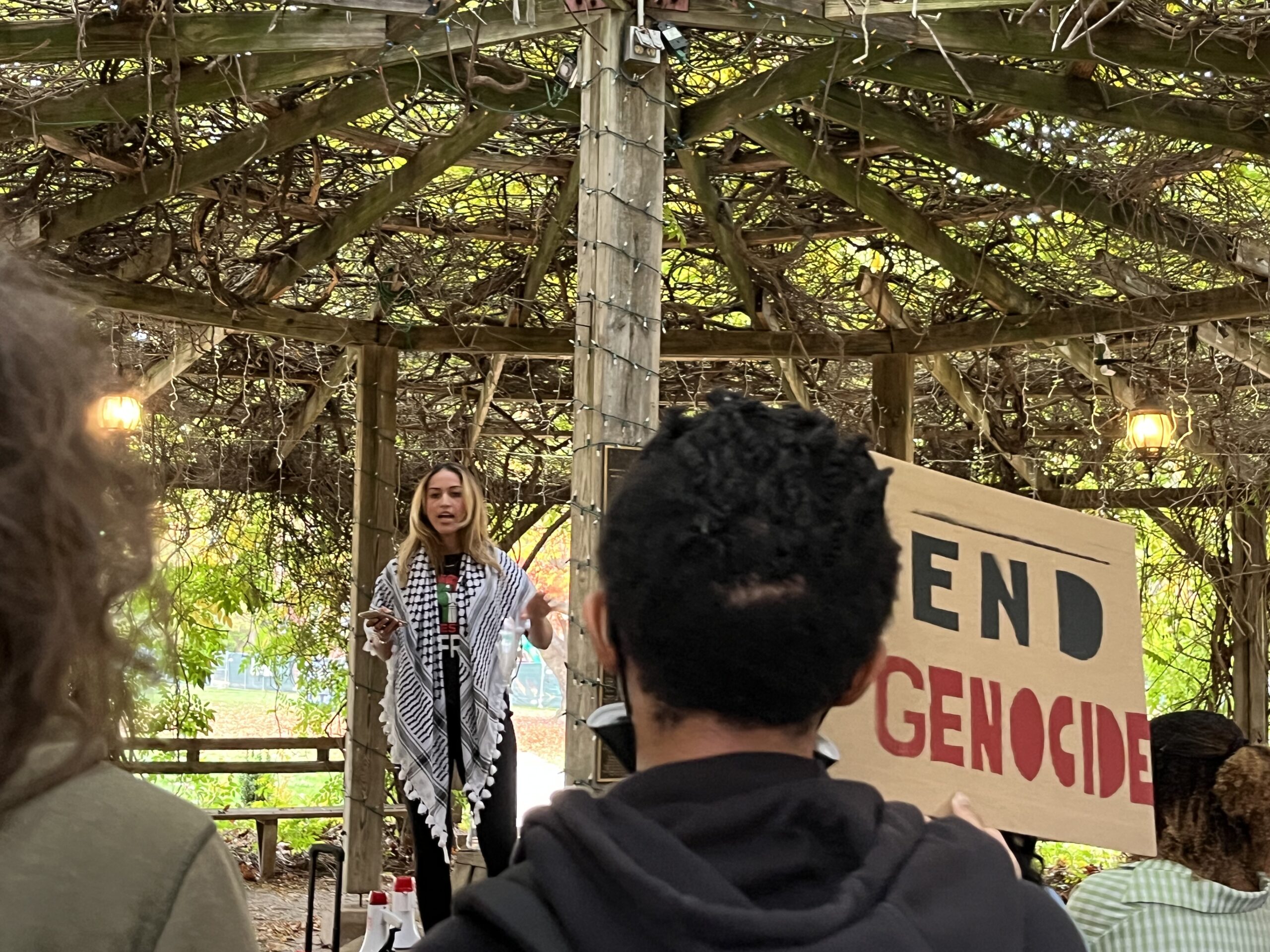
By Amrit Brown and Janiel Suren
About 100 Hood College students walked out of class in support of Palestine on Thursday.
“I just came out to show for people who are being affected [by] what is going on in Israel and Palestine,” said Ian Salak, a Hood College student.
The protest began with students walking out of their classes at 12:30 p.m. An excerpt from a sign posted advertising the date and time at Rosenstock Hall read “We demand Hood College to release a statement condemning Israel’s genocide in Palestine…”
Students chanted asking for the school administration to acknowledge genocide in Gaza and speakers lamented the lack of significant response from the school. “Instead of being proactive, the school is being reactive,” junior Asiayonna Jones said.
Khaliya Deya who was holding a sign at the walkout that read “Pres Chap WYA” believes that the school has not responded adequately to the ongoing war. “The most that we got was a small email just denouncing violence in general not speaking to the extreme atrocities going on in Gaza,” Deya said.
Yhali Steinhauer, a freshman from Israel, has a different perspective. “I respect freedom of speech and the right of people to protest. However, the recent protest failed to condemn the kidnapping of 240 Israelis, including 30 children,” he said. “The statement released by Hood’s president completely ignored the atrocities of Oct. 7. With all that being said I appreciate the efforts of Rev. Beth and others who help me in these hard times,” he added.
President Andrea Chapdelaine later sent an email to the Hood community acknowledging the students’ rights to protest but adding that she would not issue a statement taking sides on the conflict.
“One of the stated purposes of the protest was to demand a statement from the College which, in part, would express support for one side. I have communicated to the student organizers that no such statement will be forthcoming,” she said. “The second request was to express support for all those directly impacted, which I have done and do so here again.”
She continued: “These events have produced strong emotions throughout the world and our campus is certainly no exception. Further, there is no ‘one view’ that reflects our community as a whole. As president, it would not only be impossible but irresponsible for me to presume to speak for our entire, diverse community on this issue, among many others. Instead, my primary focus is on ensuring that we are striving to keep all members of our community safe, providing support where needed, and, consistent with our core mission, offering opportunities for us to learn, discuss and develop our own understanding and beliefs.”
The students who walked out of class met at the Pergola. The organizers took turns speaking on the issue following a call to chant and to march towards the front of Alumnae Hall.
The protest then marched towards Hood College’s chapel, where they offered members of the audience a chance to speak. Students protesting raised their hands to take turns to speak on the subject. More than five students from the crowd volunteered to speak in support of Palestine. The talks ranged from condemning the Israeli Defense Force to condemning the U.S. government for providing aid to Israel, its ally. One student who spoke condemned both the Hamas attack and the Israeli response.
“I think it’s mainly to show support because it’s not the issue of just being like Pro Israel or Pro Palestine. It’s more like being pro-human rights,” said Nina Goddyn, a Hood College international student.
Steinhauer said that he condemns the protestors’ signs that said, “From the river to the sea.” The words have become a rallying cry for Palestinians who wish to return to the area from the Jordan River to the Mediterranean Sea which includes Israel.
Nearly a month into the war in Israel and Gaza, the Hood College administration has had limited communication with the student body on the subject.
Just a few days after the Hamas attacks on Israel on Oct. 7, Chapdelaine issued a statement using the Hood acronym (Hope, Obligation, Opportunity, and Democracy) to express her desire for Israelis and Palestinians to be able to live in freedom and peace.
On Nov. 3, she issued the same statement as she did just days after Oct. 7, coupled with the announcement of educational forums designed to create civic discourse.
The first forum was to be held in Hodson Auditorium on Nov. 10 at noon and the second on Nov. 15 at 6 p.m.
Paige Eager, a professor of political science, is going to present a history of the Palestinian-Israeli conflict followed by a Q&A. “The specific objective is to provide an historical overview of the Israeli-Palestinian conflict since the end of WWI,” Eager said.
As of Nov. 8, 11,000 Palestinians are confirmed dead, including more than 4,000 children. More than 1,400 Israelis were killed throughout the Hamas invasion.
The Rev. Beth O’Malley has also made Coffman Chapel open to students who may be struggling with the horrors of the war.
The college has reached out to students who are directly affected by the violence.
Steinhauer said that the administration had helped support him. “For me as an individual, they responded pretty well. They connected me with Rev. Beth who was helpful and they talked to my basketball team who are supporting me all the time,” Steinhauer said. “They were very effective and very compassionate to the situation,” he added.
Ibtisam Alafghani, a junior from Gaza, also acknowledged the administration’s personal response to the events of Oct. 7 and the aftermath. “Multiple of the staff members have reached out to me, which I have appreciated a lot,” she said.
Steinhauer and Alafghani, however, both said that the administration’s neutral stance should change. Steinhauer highlighted the lack of condemnation on the actions of Hamas while Alafghani lamented the lack of discourse on the subject and the administration’s failure to recognize the reasons behind the enormous loss of life in the Gaza Strip.
“They should have highlighted Hamas and maybe more about their actions and why they should be condemned,” Steinhauer said. “I think it is clear to every reasonable person in the world that what Hamas did was wrong,” he added.
“You cannot be neutral in a situation of injustice,” Alafghani said, referring to the current lack of freedom and humane conditions in Gaza.
Alafghani added that it has been difficult for her to organize events in conjunction with the school, even neutral forums on the topic. “They do not want us to talk about it, and that is a bit weird,” she said.
It is also important to recognize, according to Alafghani, that within a week of the start of the war in Ukraine, the school had organized two events.
Steinhauer wants the student body to recognize that the issue is complicated and says that anybody who posts to social media should first do research from reliable sources. “They should all know that this is a very long and complicated conflict. At the end of the day, we are all human beings, and most of us want to live our lives as normal and respected people,” he said.
Alafghani highlighted the value of understanding the history of the conflict through its 75 years rather than starting from Oct. 7. “It is really important to realize that Gaza is a very small place. It is very crowded but it is not Hamas,” she said.
“It is a human issue in general. Whoever is oppressed, you support them,” Alafghani said. “The whole population is paying the price. It is genocide no matter, actually, how you look at it,” she added.




Be the first to comment